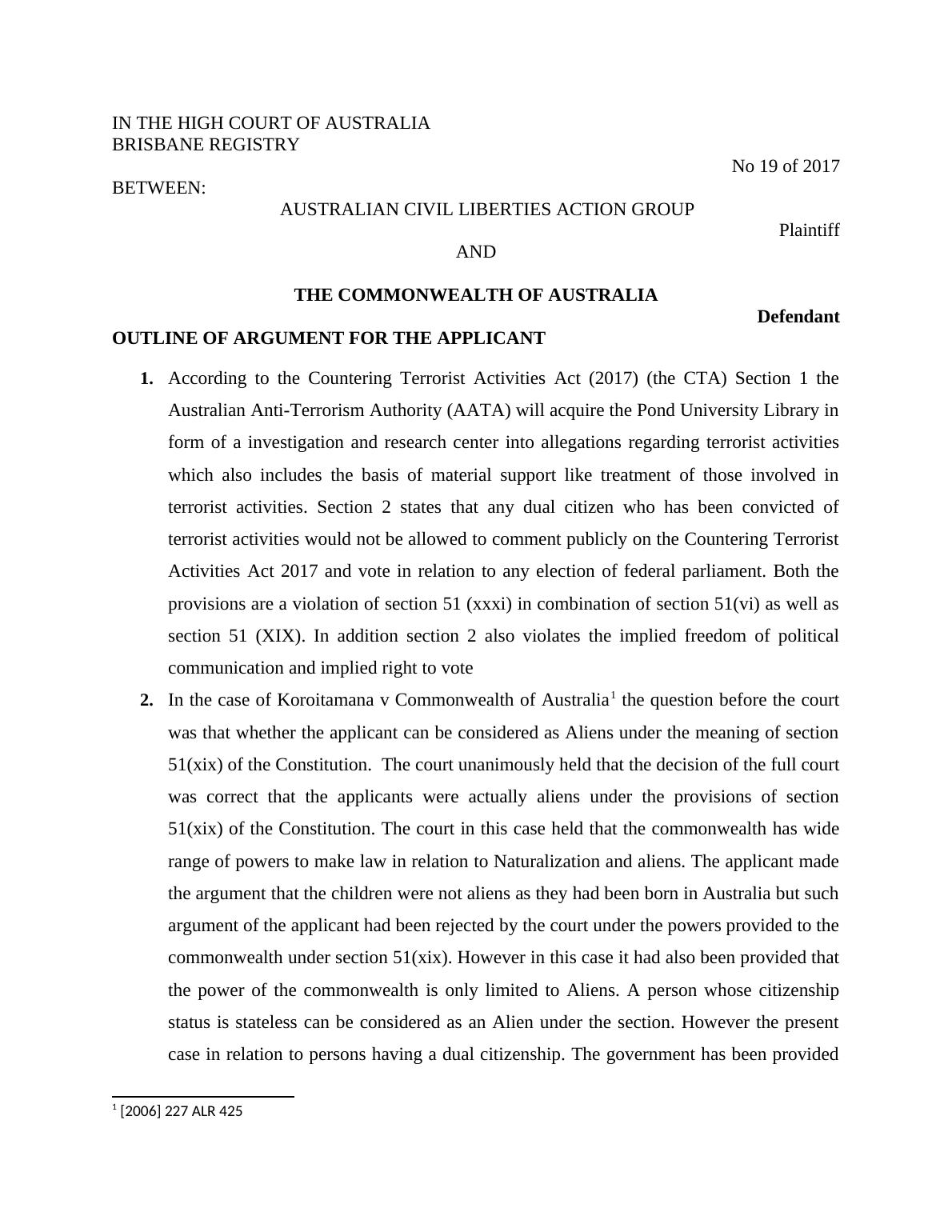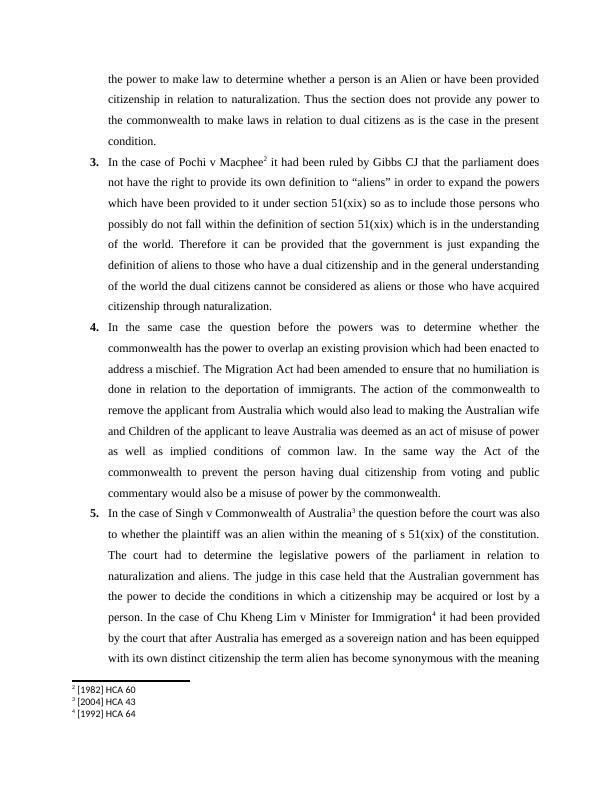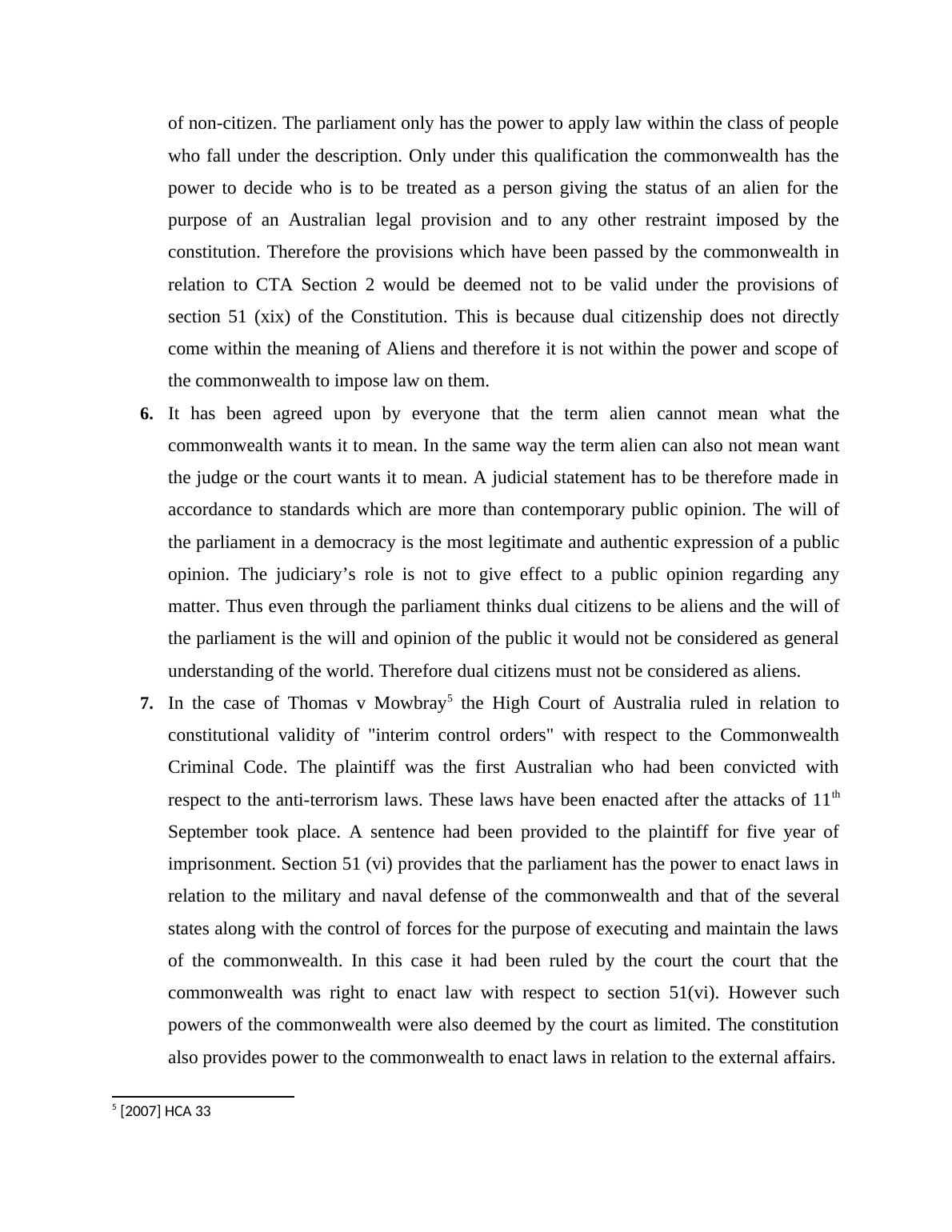Ask a question from expert
The Australian Anti Terrorism Authority (AATA)
6 Pages1865 Words76 Views
Added on 2020-04-21
The Australian Anti Terrorism Authority (AATA)
Added on 2020-04-21
BookmarkShareRelated Documents
IN THE HIGH COURT OF AUSTRALIA BRISBANE REGISTRY No 19 of 2017 BETWEEN: AUSTRALIAN CIVIL LIBERTIES ACTION GROUP PlaintiffANDTHE COMMONWEALTH OF AUSTRALIA Defendant OUTLINE OF ARGUMENT FOR THE APPLICANT1.According to the Countering Terrorist Activities Act (2017) (the CTA) Section 1 theAustralian Anti-Terrorism Authority (AATA) will acquire the Pond University Library inform of a investigation and research center into allegations regarding terrorist activitieswhich also includes the basis of material support like treatment of those involved interrorist activities. Section 2 states that any dual citizen who has been convicted ofterrorist activities would not be allowed to comment publicly on the Countering TerroristActivities Act 2017 and vote in relation to any election of federal parliament. Both theprovisions are a violation of section 51 (xxxi) in combination of section 51(vi) as well assection 51 (XIX). In addition section 2 also violates the implied freedom of politicalcommunication and implied right to vote2.In the case of Koroitamana v Commonwealth of Australia1 the question before the courtwas that whether the applicant can be considered as Aliens under the meaning of section51(xix) of the Constitution. The court unanimously held that the decision of the full courtwas correct that the applicants were actually aliens under the provisions of section51(xix) of the Constitution. The court in this case held that the commonwealth has widerange of powers to make law in relation to Naturalization and aliens. The applicant madethe argument that the children were not aliens as they had been born in Australia but suchargument of the applicant had been rejected by the court under the powers provided to thecommonwealth under section 51(xix). However in this case it had also been provided thatthe power of the commonwealth is only limited to Aliens. A person whose citizenshipstatus is stateless can be considered as an Alien under the section. However the presentcase in relation to persons having a dual citizenship. The government has been provided1 [2006] 227 ALR 425

the power to make law to determine whether a person is an Alien or have been providedcitizenship in relation to naturalization. Thus the section does not provide any power tothe commonwealth to make laws in relation to dual citizens as is the case in the presentcondition. 3.In the case of Pochi v Macphee2 it had been ruled by Gibbs CJ that the parliament doesnot have the right to provide its own definition to “aliens” in order to expand the powerswhich have been provided to it under section 51(xix) so as to include those persons whopossibly do not fall within the definition of section 51(xix) which is in the understandingof the world. Therefore it can be provided that the government is just expanding thedefinition of aliens to those who have a dual citizenship and in the general understandingof the world the dual citizens cannot be considered as aliens or those who have acquiredcitizenship through naturalization. 4.In the same case the question before the powers was to determine whether thecommonwealth has the power to overlap an existing provision which had been enacted toaddress a mischief. The Migration Act had been amended to ensure that no humiliation isdone in relation to the deportation of immigrants. The action of the commonwealth toremove the applicant from Australia which would also lead to making the Australian wifeand Children of the applicant to leave Australia was deemed as an act of misuse of poweras well as implied conditions of common law. In the same way the Act of thecommonwealth to prevent the person having dual citizenship from voting and publiccommentary would also be a misuse of power by the commonwealth. 5.In the case of Singh v Commonwealth of Australia3 the question before the court was alsoto whether the plaintiff was an alien within the meaning of s 51(xix) of the constitution.The court had to determine the legislative powers of the parliament in relation tonaturalization and aliens. The judge in this case held that the Australian government hasthe power to decide the conditions in which a citizenship may be acquired or lost by aperson. In the case of Chu Kheng Lim v Minister for Immigration4 it had been providedby the court that after Australia has emerged as a sovereign nation and has been equippedwith its own distinct citizenship the term alien has become synonymous with the meaning2 [1982] HCA 603 [2004] HCA 434 [1992] HCA 64

of non-citizen. The parliament only has the power to apply law within the class of peoplewho fall under the description. Only under this qualification the commonwealth has thepower to decide who is to be treated as a person giving the status of an alien for thepurpose of an Australian legal provision and to any other restraint imposed by theconstitution. Therefore the provisions which have been passed by the commonwealth inrelation to CTA Section 2 would be deemed not to be valid under the provisions ofsection 51 (xix) of the Constitution. This is because dual citizenship does not directlycome within the meaning of Aliens and therefore it is not within the power and scope ofthe commonwealth to impose law on them. 6.It has been agreed upon by everyone that the term alien cannot mean what thecommonwealth wants it to mean. In the same way the term alien can also not mean wantthe judge or the court wants it to mean. A judicial statement has to be therefore made inaccordance to standards which are more than contemporary public opinion. The will ofthe parliament in a democracy is the most legitimate and authentic expression of a publicopinion. The judiciary’s role is not to give effect to a public opinion regarding anymatter. Thus even through the parliament thinks dual citizens to be aliens and the will ofthe parliament is the will and opinion of the public it would not be considered as generalunderstanding of the world. Therefore dual citizens must not be considered as aliens.7.In the case of Thomas v Mowbray5 the High Court of Australia ruled in relation toconstitutional validity of "interim control orders" with respect to the CommonwealthCriminal Code. The plaintiff was the first Australian who had been convicted withrespect to the anti-terrorism laws. These laws have been enacted after the attacks of 11thSeptember took place. A sentence had been provided to the plaintiff for five year ofimprisonment. Section 51 (vi) provides that the parliament has the power to enact laws inrelation to the military and naval defense of the commonwealth and that of the severalstates along with the control of forces for the purpose of executing and maintain the lawsof the commonwealth. In this case it had been ruled by the court the court that thecommonwealth was right to enact law with respect to section 51(vi). However suchpowers of the commonwealth were also deemed by the court as limited. The constitutionalso provides power to the commonwealth to enact laws in relation to the external affairs.5 [2007] HCA 33

End of preview
Want to access all the pages? Upload your documents or become a member.
Related Documents
Restriction Imposed on Dual Citizenslg...
|8
|2024
|63
Debate in Public Lawlg...
|5
|1218
|36
Assignment Constitutional Lawlg...
|12
|2689
|38
Division of Powers under the Constitution of Australialg...
|4
|804
|333
Institution Law of Governancelg...
|7
|1778
|143
Interpretation of Commonwealth v Tasmania (1983) 158 CLR 1lg...
|8
|1989
|465